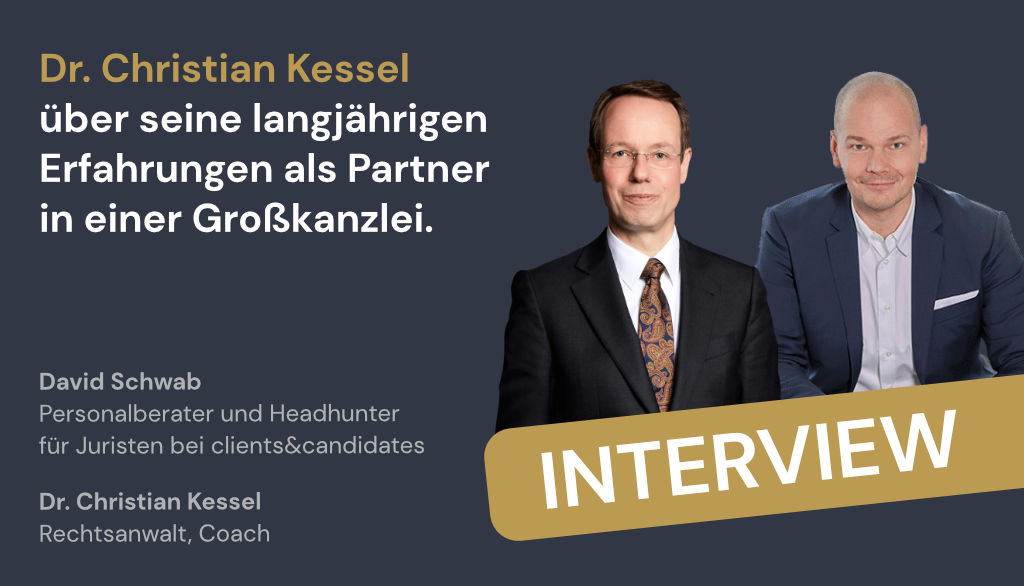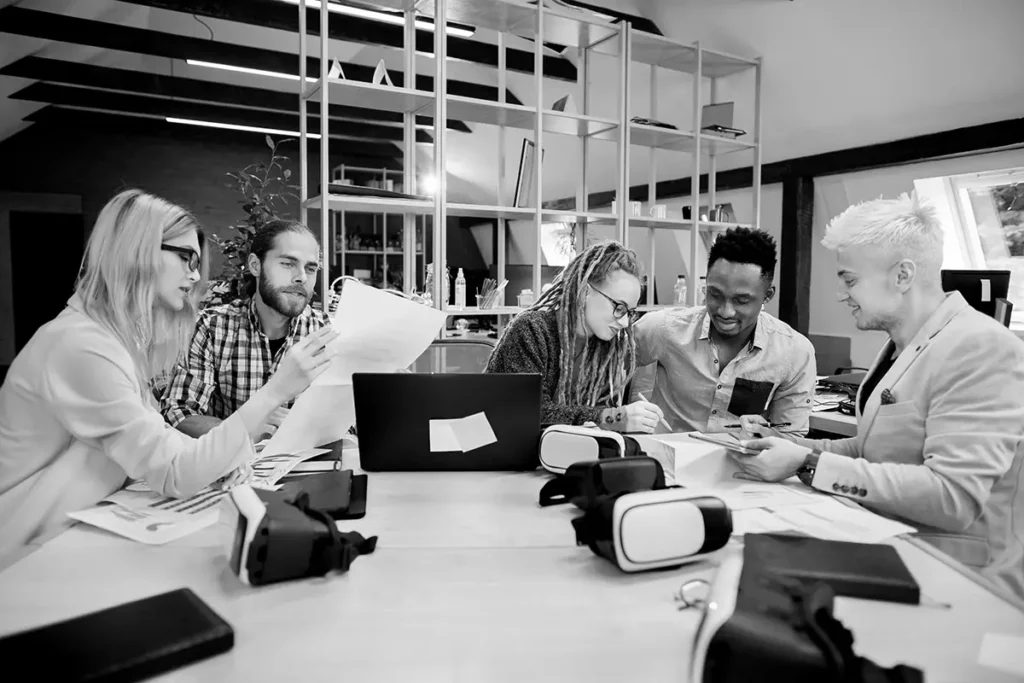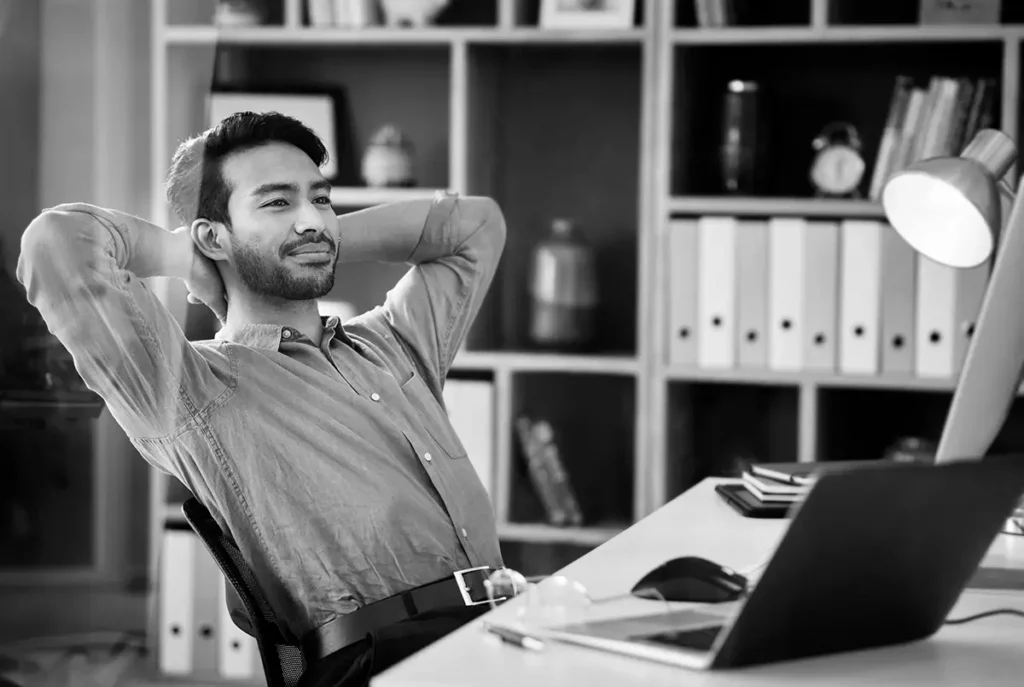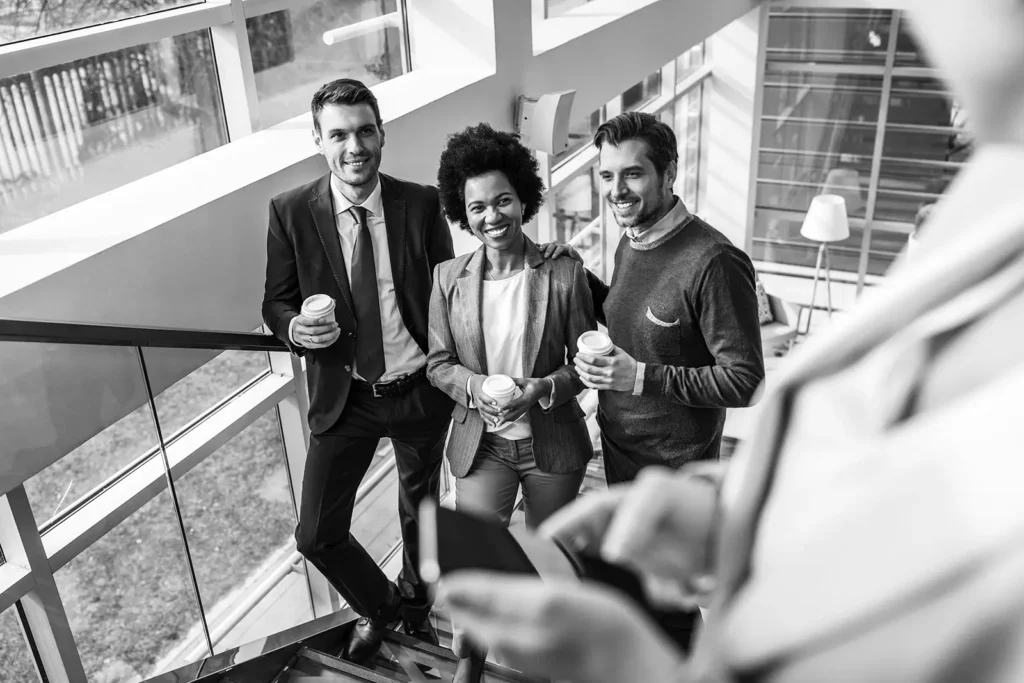Transcript of Claudia Böhnert’s interview with Dr Christian Kessel from October 2023.
Distributed originally via LinkedIn and the YouTube channel of Courage Marketing PR.
Claudia Böhnert is the founder and managing director of the agency COURAGE Marketing PR. She is a PR and marketing consultant and is regularly quoted in the media and has over 20 years of professional experience in international top 10 network agencies (BBDO, GREY, McCann), most recently in managing positions. Claudia Böhnert has been the owner and managing director of Courage Marketing PR since 2010. Together with her team, she advises well-known companies (DAX, SMEs, SAAS, start-ups) and law firms, both nationally and internationally. (https://couragecomm.de)
Dr Christian Kessel is a coach and consultant for successful business development, and was previously a lawyer and partner in two international law firms (Baker&McKenzie, Bird&Bird) for 32 years until his regular retirement in April 2022.
The text has only been slightly edited in a few cases. It largely corresponds to the spoken word in the interview.
Claudia
My interviewee today is Dr Christian Kessel. Dr Kessel is a lawyer and was a partner in very renowned law firms for many years. 14 years at Baker McKenzie and 18 years at Bird&Bird and, as I have heard, he was one of the firm’s rainmakers in recent years. And not only in Germany, but also internationally. A very interesting background, of course. Dr Kessel, Christian, a very warm welcome. I’m delighted that you’re here.
Christian
Yes, Claudia, thank you very much for inviting me. It’s a great pleasure and an honour to be here today.
Claudia
Yes, I’m delighted. So Christian, of course it’s very interesting to hear about Rainmaker, and what does that actually mean for business development and marketing? It sounds like you actually have an affinity for these areas.
Lawyers don’t like to sell?
Claudia
And I like to start with a quote that a CEO of a law firm once said: lawyers became lawyers because they don’t like to sell. What’s it like for you, Christian? Do you also dislike selling?
Christian
That’s a nice quote. I think many lawyers become lawyers without realising what’s in store for them in that respect.
You have to be a good salesman to be successful
Christian
I do believe, and this is also my personal experience, that you have to be a good salesperson, at least to be successful in large international law firms, but certainly also in all good medium-sized German law firms and in small law firms too. You may have to differentiate a little in how you acquire business. But for the medium-sized and large international law firms, you have to sell.
And nobody tells you that before you join the firm. Especially when you’re just starting out. They don’t tell you at university. During your legal clerkship, even if you do a stint at a big law firm, they don’t explain it properly and you simply don’t know about it. And I left last year and went into regular retirement, which has given me the pleasure of gaining even more insights into other law firms.
Claudia
And you are now an expert in business development yourself and you advise your former colleagues and partners, right?
Nobody in law firms explains how to do successful business development
Christian
Yes, I talk constantly to people who say I’ve been a partner for three years. But I realise that no one has ever explained to me how business development works. And it wasn’t explained to me in any of my various law firms. I also had no role models. Somehow there was no one there, but now as a partner after three years it’s just not going so well. It doesn’t flow by itself. And I don’t really know what I actually have to do and what tools are available.
What is NOT enough for successful business development
Christian
And in many law firms, the highlight of business development for associates, senior associates and counsel is giving a presentation at a law firm event. But that’s not business development. This is not the way to win clients on a large scale with whom you can build up your own business case for the partnership or with whom you can then succeed as a partner in the long term and become a successful partner in such a law firm.
How do you become a rainmaker?
Continuous and successful business development over many years.
Christian
Perhaps a sentence about the word “rainmaker”, which is not mine. It was used by my colleagues and younger partners in my team, who at some point confronted me with it: you’re a real rainmaker for all of us, and at first I swallowed, but then I realised and understood it. Yes, but that’s 32 years of continuous and successful business development. That is necessary. So selling, yes, is part of it, absolutely. And the earlier you start to acquire and learn it, the better.
Claudia
And what did you actually do? Do you have any specific tips for your partners on what to look out for?
Have a vision or develop a vision of what you want to do
Christian
For me, the most important thing has always been to have a vision or a goal, a focus. Where do I actually want to go?
At the very beginning, I once said I wanted to do telecoms contracts; that was at Baker McKenzie, where I built up a market-leading team in telecoms contract law. And then I said to myself, this is a great opportunity. The market is being deregulated. Suddenly we have 1,000 new companies on the market alongside Deutsche Telekom, they all need general terms and conditions, they all need reseller and other contracts. And I jumped on it and said, that’s what I want to do. And I put my entire business development, marketing and brand development into it as a telecoms contract law specialist.
And I did the same with the automotive supply industry and said, this is a sector, an industry that I like, these are nice, down-to-earth people, I get on well with them. It’s a great industry, it has a future in Germany and there are thousands of companies in it. If only 10 per cent of them instruct me, I’ll have plenty to do for the rest of my life. And that’s how it turned out.
So vision, where do you want to go? What is the industry or area of law in which you want to get involved and prove yourself?
Strategies for realising the vision
Christian
And then you have to think about strategies to realise that. And at some point I also left telecoms and switched to renewable energies. That’s okay too. The vision changed, but the one for automotive and suppliers remained the same. So it’s not fixed from day one until the end of your life or until you leave the law firm, you can adjust it, but you have to have a goal and not develop any wild activities, but should be goal-oriented. And then you can also build up a good practice over a relatively manageable period of time.
Claudia
Okay, yes, that’s really interesting. To hear that from you as a partner in a law firm. Because I mean, we also advise law firms and I often get the impression that there’s not really the desire and many are still of the opinion that it actually works by itself.
Do clients come by themselves – without business development?
Claudia
I hear that from time to time: Mrs Boehnert, we’re good, people talk about us, we don’t have to make an effort to really win business here. The clients come to us like that. It’s great if that’s the case. How do you see it, Christian? Especially perhaps against the backdrop of digitalisation and artificial intelligence. Because what amount of turnover of lawyers really benefits from this “coming by themselves”?
Christian
Well, I think traditionally there have been a few law firms in Germany and perhaps also teams where that was the case. And I would also say that in the automotive supply industry, the team that I built up had and still has the reputation of “this is the team you go to when you have big problems or want to deeply evaluate a topic”. But that’s not true for most law firms and it’s not true for most teams.
Being dependent on the law firm platform?
Christian
And you always have to think about this: as an individual lawyer, do I want to make myself completely dependent on this platform, the law firm and the law firm name or do I want to maintain a certain independence? A freedom, even if things in the firm take a turn for the worse, and that does happen, do I then have the freedom to pack up, move on and do I then have the clients who will come with me?
Claudia
I see. So a brand for the individual lawyer. Actually, you recommend having your own brand.
Establishing my own brand and reputation as a lawyer
Christian
Yes, exactly. Only those clients will come along who value you and preferably also those that you have acquired yourself at some point, because you have built up the closest and deepest personal relationship with them. So that’s a very basic consideration, where I say, yes, the ones that have a brand or a reputation, that’s where you automatically go. There are maybe two law firms in Germany, roughly speaking.
Yes, so there are more teams with a brand or reputation , but as a law firm, in my perception, in my estimation, there are two, but it doesn’t matter. So congratulations, congratulations to the colleagues. That’s great.
But even they are bound to a certain extent. And if they’ve never learnt Business Development, there’s a high risk involved in switching, because it’s not so easy to know whether everyone will really come along. So, that’s one thing.
How business development is changing – AI, social media, etc.
Christian
And to the second part of your question. Of course, business development as a whole is changing a lot. On the one hand through social media and everything that is now digitally possible, but of course also through artificial intelligence, where it is suddenly much easier to have things written, to have things designed, to generate ideas, to generate small text modules differently. And I think young colleagues will certainly have to jump on board. They don’t have the brand, they have to develop it that way. I mean, I can honestly say that I didn’t get involved with social media until I started my own business or rather until I was due to retire. Simply because I didn’t have the time, because I was far too busy with client work. And it’s a lot of work to be constantly present there.
But what suits me personally?
Christian
But I think you also have to see what suits you? So does this constant LinkedIn or other writing and being present really suit me personally?
I think it’s good to create a mix between more traditional business development and modern business development
I’m still struggling with the extent to which I really want to use AI. I still write all my texts myself, because I believe that they are more personal to me and more authentic, and that my thoughts and experiences from 32 years come across differently than if I had them written for me . And I also have enough imagination and I also have the time for it. But as I said, everyone has to find out for themselves and try it out. And I also realise that with the people I coach, an important point is what really suits the individual person as the optimal one or two business development tools?
Claudia
Yes, everyone is different in this respect. Interesting. Yes, really interesting. And I mean, what we recommend on LinkedIn, so LinkedIn is really one of the most efficient and effective channels for law firms in the business sector as well. It’s a lot. I mean, it’s currently getting a bit out of hand, also due to AI, the activities and the number of posts. That’s why we often recommend taking a strategic approach, saying who your target group really is and posting to your target group and also addressing the target group directly.
The importance of AI and the impact on business models
Claudia
But Christian, let’s go back to AI once more. You’ve now talked about how your work is changing. Perhaps you’ve seen it, I also made a video with PwC, where the head of PwC says very harshly: “In two years, lawyers’ jobs will change completely, I’ll put it that way now, he was even a bit tougher, the clients, their behaviour will also change. Both on the corporate side, the in-house lawyer, who is increasingly using chat GPT and other AI and then the law firms, as I hear from the industry, are increasingly only using it for counter-checks. In other words, they have already prepared everything themselves and say to the law firm, take another look, is that okay? This means that the number of billable hours could drop significantly. How do you see that?
Christian
Well, I think we’re really in this intermediate phase where a lot of things are developing and a lot of forecasts are going in one direction or another. I can imagine all of this, whether it will be realistic in two years’ time or perhaps in five years’ time or perhaps even later – I find it difficult to form a definite view.
At the moment, I can see that many of my colleagues and everyone I talk to are still doing a lot without AI. But that AI is indeed already being used to a certain extent for standard memos or standard information and that AI is indeed already partially replacing the work of research assistants, trainee lawyers and junior associates. I think it’s actually starting to be the that way across the board but that everyone is doing it this way I am not aware of.
You also have to realise that we’re not starting from scratch. Every law firm and every team has its own standard precedents for general terms and conditions or something like that. In my opinion, there is no great need to have KI make me a new sample contract straight away. So a commercial agency agreement, general terms and conditions of purchase for the sale of movable goods – everyone who works on this has this in their machine, they get it from there and either adapt the general precedent or the last version that they sent to another client.
Claudia
I understand, Christian. Sorry if I’m interrupting here. What I would be interested to know, just based on your experience, is whether you’ve heard that clients’ requests have changed. Because if I were a client now, I would say: okay law firms, I want to save a bit of money here. I try to sort out the initial issues in-house and perhaps develop the first draft and then say “So law firm, check again”. That’s also the theory I hear outside. The absolute number of hours at law firms will be reduced and sometimes you hear up to 50 per cent because of this.
Possible new forms of collaboration between clients and external lawyers due to AI
Christian
I think we’re mainly hearing this from the USA at the moment. I haven’t yet noticed or heard of this in Germany in such a drastic form. But that may be a coincidence. I can’t judge that. But of course, these things will develop in this way. The question is, of course, if I get this as a lawyer to check it, I still have to read it very carefully and thoroughly and I have to read it more carefully and with more concentration and more slowly than if I were to use my own sample to draw up a set of general terms and conditions or a contract myself. But these are questions about how business models develop. It’s also a question of what a company then asks for? Do they say “here, two hours maximum, we won’t pay more”? Maybe. It remains to be seen whether that will be enough to check the validity of 15 pages of general terms and conditions.
Claudia
Yes, I see. Yes, well, nobody knows at the moment. I think we’re learning at the moment, I’m also hearing that from law firms: see how things develop, also for in-house lawyers,see how things develop there, whether they perhaps position themselves differently, perhaps bring in more young lawyers, how they can hand over work. Or in the law firms it is exciting to observe , how is the work of the associates changing? Do you see any changes in terms of content?
Is this the last generation of well-trained associates?
Christian
If, as we all expect, AI plays an extremely important role and many things that are traditionally done by young associates today are no longer done by them, then the question is, of course, how are they trained? How do they gain the experience to really have the seven or eight years of experience at partner level that will qualify them to act on their own responsibility for the firm and represent it, and, in the worst case scenario, to be liable or be able to avoid liability cases? So these are questions that concern me, where I ask myself, is this the last generation of well-trained lawyers?
That’s a somewhat provocative question. But I believe that in the intermediate phase we are in – everything is new. We are all feeling our way forward, some a little faster and more progressive, others a little more cautious and reserved. These are already relevant questions.
Personal high-end advice from a mature legal personality will remain
Christian
And I think it will ultimately remain the case that a client will always seek a personal assessment from an experienced lawyer for the big strategic decisions and questions. This doesn’t have to be a partner, it will usually be the partner, but it can also be an experienced senior associate or counsel.
I believe that this form of legal advice will remain, but you have to be qualified for it. And of course you have to have undergone a certain amount of development, both technically in terms of the law and in terms of personal development.
And then, and this brings us back to the starting point, you also have to be able to sell and establish yourself as a brand on the market, not just be the lawyer who sends out prompts and then presses the button and passes on some AI products, but that you really create your own added value and that you are also strategically asked about and instructed for this high-end advice by the general counsel, perhaps the board of directors, the managing director, perhaps also the head of sales at medium-sized companies, whoever the contact person is, and then really have a distinct opinion.
Being able to give personal recommendations
Christian
And I have also experienced in my career that clients have told me that they have received ten well researched legal views on the subject from a law firm, but they don’t tell them what they should do now. I have always distinguished myself by doing this and I believe that good lawyers are also characterised by the fact that they tell a client: I would do it this way if it were my company.
The client can then still say: No, it’s too risky for me or not risky enough or whatever. But you should say : my opinion is that path C of A, B, C and D is the most promising and straightforward . And I think that will always remain the case.
Being visible to the outside world
Claudia
Yes, and Christian, perhaps I can add one more point to what you said. The brand is important, we see that in other sectors too, it’s really extremely important to position yourself, but above all to communicate it to the outside world. Because even if you’re the best lawyer or I’ll say it out loud, even if you have a Porsche to give away, if nobody knows about it, they won’t approach you. That means you have to communicate to the outside world, even if it’s not everyone’s cup of tea, so that people see you. And there are simply certain criteria for this in social media and also in the press. You have to use the media that suits you in order to be seen by your clients. And I think that’s becoming increasingly important, isn’t it?
Christian
Yes, I completely agree. Especially as the number of competitors doing this is constantly increasing thanks to all these digital possibilities and social media. And that’s why it’s becoming increasingly difficult to make yourself known if you don’t utilise these tools. So I don’t know whether you get your entire business from it; there are people who say that, I understand that too, that’s also credible. And others also say that it’s one of the many ways I use to acquire business.
And that brings us back to the starting point. Everyone has to decide for themselves. But I do believe that you have to publicise and make yourself known through all these means (social media and all digital possibilities) and build up your brand.
Claudia
So a brand is becoming more important, also for the lawyer, not just for the law firm. And also publicise this brand externally, you say, and then also through the channels that suit the person and ideally also channels that reach the most target group, as we always say from a marketing perspective.
Christian, if you’re advising a managing partner and he asks you, Dr Kessel, what do you recommend? How do we get our associates? How can we orientate ourselves more strongly in terms of business development? And you could now give three tips. What would these three tips be?
Key tips: Vision, empowerment
Christian
Well, I think the one thing as I said earlier is to develop a clear vision for partners and teams and also the younger lawyers of where they want to go so that they have a good direction and don’t go wild.
I think it’s extremely helpful for partners to be willing and able to guide their team to develop business themselves. I always call this empowerment. It’s such a nice English term, but for me it means that I’m able not to want to do everything myself or feel I have to do everything myself. There are still people who say: “No, but business development is a partner’s job”.
Business Development is not just alone a task for partners
Christian
I would not have been so successful if I had not automatically involved all my team members, from first-year associates to lateral counsel, in business development during their first year with me, encouraged them, provided them with advice and support, of course, but also made sure that they did something. And that set a dynamic in motion where all the team members acquired clients independently. As long as they weren’t partners, they were naturally attributed to me, and I held these clients in trust for them, and when they became partners, they were transferred to them.
Triple win situations
Christian
And that’s a triple win situation. The law firm benefits overall. I benefit as a partner and the employees who are not yet partners benefit because they have a sense of achievement, because they are learning the business and because they are already generating clients and turnover that will benefit them later as they are held by me only in a fiduciary capacity in the meantime.
Claudia
Very good. Very interesting. I hear that a lot, that the partner says it’s partner business. Interesting how you handle that. That’s certainly a good tip for one or the other. And maybe you can get the associates involved in a new way.
Christian
But empowerment is not for everyone. Many partners are not capable of this empowerment or don’t see it as an opportunity for themselves and you need a minimum team in which you are also prepared to invest and to guide and motivate them. That is also work.
Business development is work
Christian
But business development is always work. You have to realise that it’s always an add-on to the business. If you wait until you have a quiet phase, you’ve already done something fundamentally wrong. There should never be a quiet phase.
Christian
Okay, very interesting. Christian, then we’re almost at the end of our conversation. Is there anything else that’s important to you that you would like to add? Otherwise, perhaps you have a final word for your former colleagues, for your partner colleagues, that you would like to share here.
Request or offer business development training
Christian
So I can only say – to all lawyers, whether partners or younger – look for role models, ask around, and for the associates I can only say and for the counsel, all those who are not yet partners, demand business development training in your law firms, and I also say this to the partners: For me, good training to become a lawyer includes sales, business development, acquisition just as much as legal work, drafting contracts, writing pleadings, etc. It’s all part of one and the same professional personality profile.
Claudia
Okay, very interesting. Christian, thank you very much for the interesting interview.
Christian
That was fun. Thank you very much.
Claudia
Yes, and I wish you continued success in your business development and in your discussions with partners. I’m looking forward to it. Let’s stay in touch. I would be really interested.
Christian
Absolutely. With pleasure. I’ll be in touch again.






